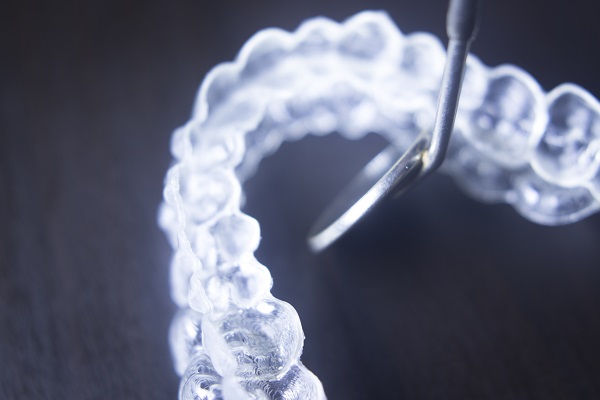5 Things to Avoid During Invisalign Teeth Straightening

Over the years, more people have started to use Invisalign® to fix an imperfect smile. Those who have spent years dealing with a crooked smile may struggle with self-confidence in their appearance. Thankfully, clear orthodontic aligners can help improve a smile subtly, without anyone else noticing. However, for these braces to work properly, there are some things to keep in mind when wearing them.
What to expect
To get the desired results, there are some things that should be done to maximize the aligners' effectiveness.
Wear for 20-22 hours a day
These aligners cannot be worn while eating, but wearing them for 20-22 hours a day is recommended. This gives the aligners maximum contact with the teeth, which will lead to faster results.
Expect slight discomfort at first
With each new set of Invisalign®, it may take a few days to adjust to the feel. Thankfully, in only a few days, the teeth will have adjusted to the aligners, making them less noticeable.
Ask if a retainer will be needed afterwards
For some people, teeth try to revert back to their old position. In these cases, a retainer may be recommended to prevent this from happening. This generally is determined on a case-by-case basis.
5 things to avoid
Keeping the aligners in good condition is important to ensure maximum results. For this reason, there are some things that should be avoided for the duration of the Invisalign® treatment.
1. Avoid snacking
The aligners will need to be removed when eating or drinking anything but water. Skipping snacking can make this easier. It can also help ensure the aligners are in for the recommended 20-22 hours every day. Stick with a set amount of meals and snacks every day if possible.
2. Limit coffee
Beverages other than water should be avoided while the aligners are in, as they can become stained if worn while drinking coffee, soda or tea. Many people sip on coffee in the morning, but because the aligners must be removed during this time, it reduces the amount of time Invisalign® is in the mouth.
3. Do not chew gum
Gum can easily stick to and damage the aligners. Removing the aligners to chew gum does not make a lot of sense, as it reduces the amount of time the aligners are on the teeth. Even sugar-free gum, which the American Dental Association says can improve dental health, should be avoided during Invisalign® treatment.
4. Never leave home without a toothbrush
After removing the aligners to eat, the teeth should be brushed before putting them back in. A travel-sized toothbrush may be a good idea to ensure teeth can be brushed on the go.
5. Do not take a day off from wearing aligners
It may be tempting, but skipping a day wearing the aligners can hinder their progress. Wearing the aligners daily is what straightens the teeth properly.
Straightening smiles with ease
Invisalign® can straighten your smile, leading to increased confidence when smiling. Taking proper care of the aligners will ensure they stay in good condition, and wearing them when recommended will increase their effectiveness moving the teeth.
Are you considering Invisalign® in the Marietta area? Get more information at https://www.mytotaldentistry.com.
Check out what others are saying about our services on Yelp: Read our Yelp reviews.
Recent Posts
Dental implants can prevent tooth loss from affecting oral health, facial structure, and overall quality of life. While tooth replacements like traditional dentures and dental bridges provide functional and aesthetic improvements, implants offer superior advantages in durability, jawbone preservation, and smile aesthetics. Understanding these benefits can reveal whether dental implants are your best option for…
Selecting an effective way to replace missing teeth can be a significant decision, and dental implants often offer a dependable solution that restores both function and appearance. These specialized fixtures fuse with the jawbone to form a solid foundation for replacement teeth. However, it is important to note that not everyone automatically qualifies for this…
Tooth loss affects many people, but dental implants provide a reliable and lasting solution. Unlike other options, implants replace missing teeth in a way that looks and feels natural. They improve oral health, restore function, and enhance appearance. Understanding why implants are the preferred choice can help you make the best decision for your smile.Designed…
Achieving a bright, functional smile can be life-changing, and dental implants stand out as a dependable solution for replacing missing teeth. These implants anchor into the jawbone, restoring comfort and the aesthetics of natural teeth. However, proceeding with this procedure requires thoughtful preparation and clear communication with a dental professional. Below are five important topics…


